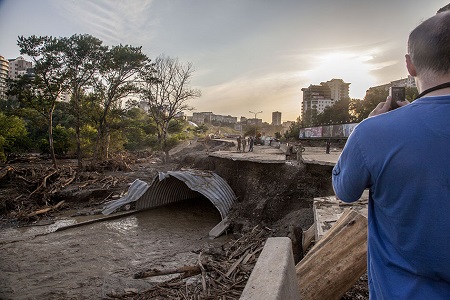Flood-damaged roads in Tbilisi reopen today

All of the roads that were extensively damaged in the deadly flood that hit Tbilisi on the night of June 13 have been fully restored and reopened.
One of the main roads in Georgia’s capital - the New Highway, also called the Chabua Amirejibi Highway – was fully restored and opened to traffic today.
Several damaged road sections were reopened last month and the remaining sections of damaged roads were reopened today, Tbilisi City Hall confirmed.
The June 13 overnight flood claimed the 19 lives, two people still remain missing, and incurred up to 100 million GEL in damages on local infrastructure.

The reopened section of Marshal Gelovani Ave. Photo by Tbilisi City Hall.
As of today, cars can now move freely along the entire New Highway (Chabua Amirejibi Highway), which connects Heroes Square to Tamarashvili St. Also, cars no longer have to detour around the flood-damaged section of the Marshal Gelovani Ave, on the outskirts of Tbilisi.
Click here to see the city before and after the flood.
The road reconstruction works cost 14.7 million GEL and were carried out by the Black Sea Group and the Caucasus Road Project. The full cost of the roading reconstruction was funded by the Tbilisi city budget.
The local government also funded the restoration of a pedestrian bridge in Mziuri Park, off Chavchavadze Ave. The park was one of the most affected areas caused by the disaster.
It cost 1 million GEL to rebuild the bridge, which was constructed in 1958. This work was carried out by local construction company Mamisoni Ltd.

Mziuri Park after the flood. Photo by N.Alavidze/Agenda.ge.
This was the second reopening of repaired roads damaged by the flood.
On September 15 a large section of the New Highway (Chabua Amirejibi Highway), that connected Vake and Saburtalo districts, opened after being restored.
The June 13 flood was believed to have been caused by a landslide in nearby Akhaldaba village, which lies nine kilometres above Tbilisi. The landslide careered down the hill and blocked Vere River, before the river burst and tonnes of water and debris surged towards Tbilisi.
 Tweet
Tweet  Share
Share